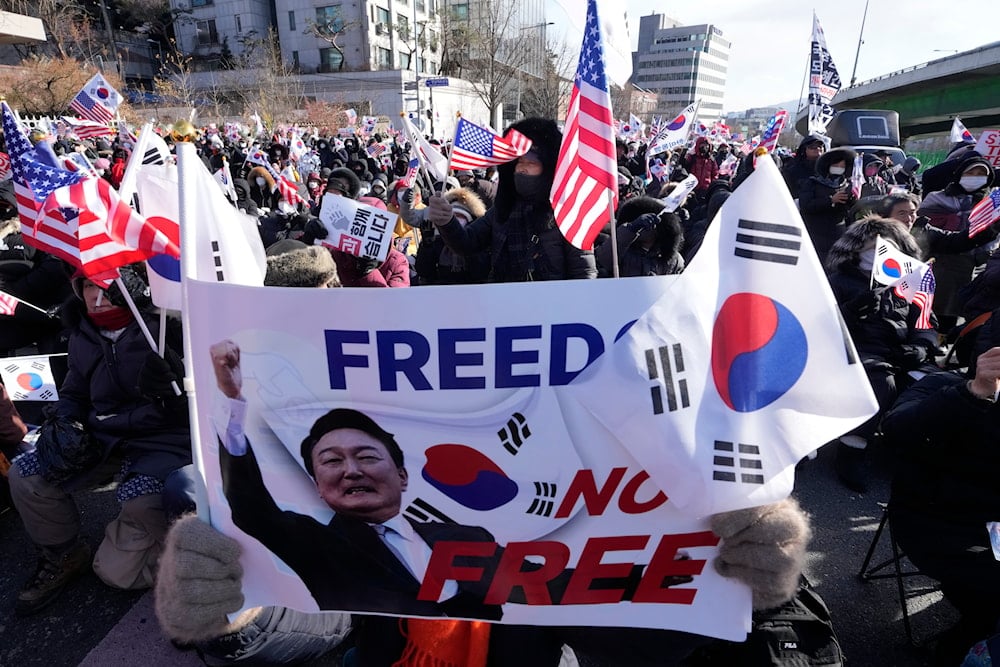South Korean opposition’s support dips as Yoon defies arrest
According to a poll released by Gallup Korea, the approval rating for the opposition Democratic Party dropped to 36%, a decrease of 12 percentage points.
-

Supporters of impeached South Korean President Yoon Suk Yeol stage a rally to oppose his impeachment near the presidential residence in Seoul, South Korea, on January 9, 2025. (AP)
Bloomberg reported on Friday that the approval rating for South Korea's main opposition party, which has been spearheading the impeachment campaign against President Yoon Suk Yeol, dropped as investigators face difficulties in apprehending the embattled leader.
Gallup Korea's poll, released Friday, showed that the approval rating for the opposition Democratic Party dropped to 36%, down 12 percentage points from December's survey. Meanwhile, support for Yoon's People Power Party increased to 34% from 24%, surpassing the level of support recorded just before Yoon's martial law decree, as reported by Bloomberg.
The latest poll, conducted among 1,004 respondents nationwide, had a margin of error of plus or minus 3.1 percentage points, according to Gallup Korea.
According to the report, the drop in support for the opposition follows its impeachment of Prime Minister Han Duck-soo, who briefly served as acting president, and investigators' failure to arrest Yoon last week after an hours-long standoff with his security team.
“These events appear to have heightened a sense of crisis among the ruling party supporters over a power transition, while dampening expectations by moderates and liberals that had been supporting the main opposition party,” Gallup Korea said in the report.
Support for opposition leader Lee Jae-myung as the next president dropped to 32% from 37% in the previous survey conducted shortly after Yoon's impeachment on December 14. The latest poll showed that 64% of respondents favor Yoon's impeachment, while 32% oppose the campaign.
Yoon steadfast against his arrest
According to the Bloomberg report, the Corruption Investigation Office for High-ranking Officials is evaluating how to arrest Yoon, following their failed attempt to question him last week regarding his Dec. 3 martial law declaration. That said, Yoon has stood firm, asserting that his actions were protected by his constitutional rights.
In addition to the criminal investigation, the Constitutional Court is set to begin a trial on Jan. 14 to determine whether Yoon should be removed from office, a process that could take up to six months. If the impeachment is upheld, South Korea will be required to hold an election within 60 days.
It is worth highlighting that Seok Dong-hyeon, a lawyer representing Yoon, claimed that the arrest attempts were politically motivated and intended to humiliate the president by parading him in handcuffs. He also referenced media reports suggesting that the police plan to use armored vehicles and helicopters to deploy special police units into the presidential compound to facilitate Yoon's arrest.
Seok stated that Yoon and his advisers view the current situation as an ideological battle between defenders of free democracy and those opposing it. "We're saying that if things go wrong, it could escalate into civil war," Seok warned.
Yoon has defended his decision to declare martial law, claiming it was necessary to remove "anti-state" forces that were disrupting government functions and endangering democracy.
He has refused to appear for questioning three times and remained at his residence, guarded by hundreds of security personnel preventing his arrest.

 3 Min Read
3 Min Read








